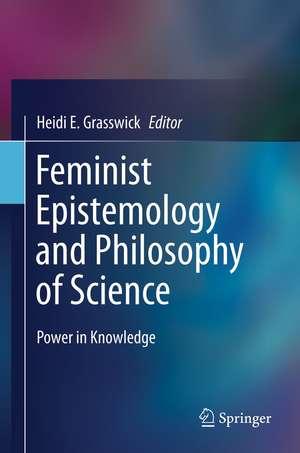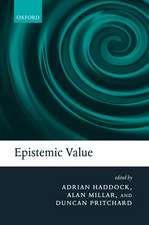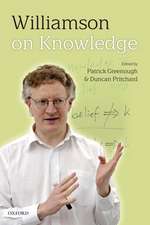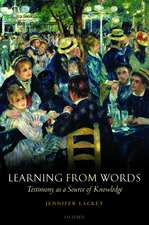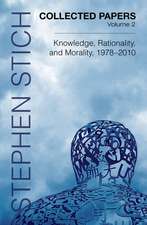Feminist Epistemology and Philosophy of Science: Power in Knowledge
Editat de Heidi E. Grasswicken Limba Engleză Paperback – 21 aug 2014
Feminist Epistemology and Philosophy of Science: Power in Knowledge collects new works that address today’s key challenges for a power-sensitive feminist approach to questions of knowledge and scientific practice. The essays build upon established work in feminist epistemology and philosophy of science, offering new developments in the fields, and representing the broad array of the feminist work now being done and the many ways in which feminists incorporate power dynamics into their analyses.
| Toate formatele și edițiile | Preț | Express |
|---|---|---|
| Paperback (1) | 999.14 lei 6-8 săpt. | |
| SPRINGER NETHERLANDS – 21 aug 2014 | 999.14 lei 6-8 săpt. | |
| Hardback (1) | 1004.19 lei 6-8 săpt. | |
| SPRINGER NETHERLANDS – 18 mai 2011 | 1004.19 lei 6-8 săpt. |
Preț: 999.14 lei
Preț vechi: 1218.46 lei
-18% Nou
Puncte Express: 1499
Preț estimativ în valută:
191.25€ • 207.81$ • 160.75£
191.25€ • 207.81$ • 160.75£
Carte tipărită la comandă
Livrare economică 21 aprilie-05 mai
Preluare comenzi: 021 569.72.76
Specificații
ISBN-13: 9789400795044
ISBN-10: 9400795041
Pagini: 300
Ilustrații: XXX, 268 p.
Dimensiuni: 155 x 235 x 16 mm
Greutate: 0.42 kg
Ediția:2011
Editura: SPRINGER NETHERLANDS
Colecția Springer
Locul publicării:Dordrecht, Netherlands
ISBN-10: 9400795041
Pagini: 300
Ilustrații: XXX, 268 p.
Dimensiuni: 155 x 235 x 16 mm
Greutate: 0.42 kg
Ediția:2011
Editura: SPRINGER NETHERLANDS
Colecția Springer
Locul publicării:Dordrecht, Netherlands
Public țintă
ResearchCuprins
Introduction: Feminist Epistemology and Philosophy of Science in the Twenty-first Century; Heidi E. Grasswick.- I Intersections: Feminism, Epistemology, and Science Studies.- 1. The Marginalization of Feminist Epistemology and What That Reveals About Epistemology ‘Proper’; Phyllis Rooney.- 2. Contextualism in Feminist Epistemology and Philosophy of Science; Kristina Rolin.- 3. Altogether Now: A Virtue-theoretic Approach to Pluralism in Feminist Epistemology; Nancy Daukas.- 4. The Implications of the New Materialisms for Feminist Epistemology; Samantha Frost.- 5. Interrogating the Modernity vs. Tradition Contrast: Whose Science and Technology for Whose Social Progress?; Sandra Harding.- II Democracy and Diversity in Knowledge Practices.- 6. Is Millian Democratic Science the Right Model for Feminist Science?; Kristen Intemann.- 7. What’s in it for me? The Benefits of Diversity in Scientific Communities; Carla Fehr.- 8. What Knowers Know Well: Women, Work and the Academy; Alison Wylie.- III Contexts of Oppression: Accountability in Knowing.- 9. More than Skin Deep: Situated Communities and the Case of Agent Orange in the Aluoi Valley, Viet Nam; Nancy McHugh.- 10. ‘They Treated Him Well’: Fact, Fiction, and the Politics of Knowledge; Lorraine Code.- 11. Wrongful Requests and Strategic Refusals to Understand; Gaile Pohlhaus, Jr.- 12. Liberatory Epistemology and Sharing Knowledge: Querying the Norms; Heidi E. Grasswick.- Index.
Notă biografică
Heidi Grasswick is Professor of Philosophy at Middlebury College in Vermont, USA. She holds a Ph.D. from University of Minnesota, an M.A. from Dalhousie University in Canada and a B.A. from University of Victoria in Canada. She is a former president of the Society for Analytical Feminism and the Canadian Society for Women in Philosophy and currently serves as an Associate Editor of the feminist philosophy journal Hypatia. Her research interests fall at the intersection of feminist epistemology and social epistemology, with a specific concern for the ethics of knowing well. She has published articles on the relationship between individuals and communities in knowing, the relationship between feminist and social epistemology, and more recently, the role of trust in sound knowledge-seeking.
Textul de pe ultima copertă
This collection brings together exciting new works that address today’s key challenges for a feminist power-sensitive approach to knowledge and scientific practice. Taking up such issues as the role of contextualism in epistemology, democracy and dissent in knowledge practices, and epistemic agency under conditions of oppression, the essays build upon well-established work in feminist epistemology and philosophy of science such as standpoint theory and contextual empiricism, offering new interpretations and applications. Many contributions capture the current engagement of feminist epistemologists with the insights and programs of nonfeminist epistemologists, while others focus on the intersections between feminist epistemology and other fields of feminist inquiry such as feminist ethics and metaphysics.
An important resource both for students and scholars of feminist epistemology and philosophy of science, with sections of interest to social epistemologists and philosophers of science more generally, this collection represents the broad array of the feminist epistemological work now being done, and the many ways in which feminists incorporate power dynamics into their analyses. It clearly represents both the breadth and the depth of this now well-developed area of feminist scholarship.
An important resource both for students and scholars of feminist epistemology and philosophy of science, with sections of interest to social epistemologists and philosophers of science more generally, this collection represents the broad array of the feminist epistemological work now being done, and the many ways in which feminists incorporate power dynamics into their analyses. It clearly represents both the breadth and the depth of this now well-developed area of feminist scholarship.
Caracteristici
Third generation feminist work on today's key challenges for a power-sensitive feminist approach to questions of knowledge and scientific practice Addressing the many ways in which feminists incorporate power dynamics into their analyses Goes beyond the classic divisions of feminist empiricism, feminist standpoint theory, and feminist postmodernism, offering new interpretations and new applications of these approaches Includes a contribution from feminist epistemology pioneer Sandra Harding
